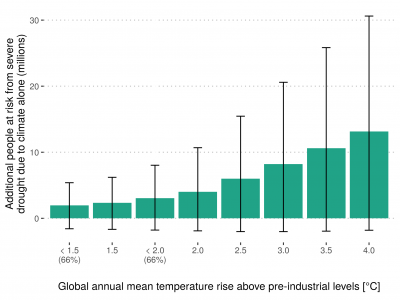As part of the Impacts and Risk Assessment to better Inform Resilience Planning (IMPRES) project, Bristol is analysing the latest climate model projections of the UK’s future climate (UKCP18) to investigate potential changes in future heat exposure risk. Heat stress can have implications on human comfort, workability and health, and understanding how it could change in the future is crucial for planning adaptation and mitigation strategies in response to changing climate. There are multiple methods for defining heat stress, with two metrics used so far in the IMPRES scoping project: simplified wet bulb globe temperature and Humidex, both of which calculate heat stress risk as a function of temperature and humidity. A total of 35 UKCP18 model simulations from 3 ensembles are currently being analysed and benchmarked, including those from CMIP5 global climate models and the UK’s HadGEM3 global and regional model, to explore possible applications of these data to better understand heat-health climate impacts.
The IMPRES team has used existing models to create some estimates of projected future climate change risks in the UK, including water scarcity, fluvial flooding, drought, heat stress, and the implications for biodiversity, natural capital, and the economy. These estimates are based on pattern scaled output from global circulation models. The team is now scoping out how to improve on these estimates by working at finer spatial scales and by using the new UKCP18 datasets. An important part of this work is to compare the pattern scaled climate change output with the new UKCP18 data. Finally, the team will implement improved calculations of future levels of risk of heat stress and drought (see below). The project team is based at the Tyndall Centre in the University of East Anglia, collaborating with partners at the University of Bristol and elsewhere.
IMPRES is designed to use existing CMIP5 driven model output to rapidly scope the risks of climate change on a wide-variety of impacts to identify where in the UK, and at what temperatures these occur. IMPRES speaks directly to inform user needs by rapidly providing new estimates of risks, including heat stress to people and livestock, flood risk, water security and agriculture, biodiversity and natural capital, and the UK economy. IMPRES then goes further by using both of the approaches above – existing data consideration, and scope the work necessary to use the UKCP18 data when needed. We have access to two sets of climate change projections, an existing dataset derived by the Tyndall Centre from global circulation models (GCMs) and a more detailed dataset recently released with greater spatial and temporal detail in the UK region, known as UKCP18. Previous assessments of climate-change related risk in the UK have tended to use disparate socioeconomic and climate scenarios, and our project will be ground-breaking in using a harmonised set of scenarios to project future levels of risk across human and natural systems in the UK in a spatially explicit fashion.

Publications
A T Kennedy-Asser, G Owen, G J Griffith et al (2022). Projected risks associated with heat stress in the UK Climate Projections (UKCP18). Environmental Research Letters. 17 034024
A T Kennedy-Asser, O Andrews, D M Mitchell and R F Warren, (2021) Evaluating heat extremes in the UK Climate Projections (UKCP18). Environmental Research Letters. 16 014039
Watch Climate Resilience webinar, 22 July 2020: IMPRES: Impacts and risk assessment to better inform resilience planning with Prof Rachel Warren (Tyndall Centre, University of East Anglia), Alan Kennedy-Asser and Jeff Price, with a response by Gemma Holmes, Committee on Climate Change. Part 1, part 2, part 3 and part 4.
